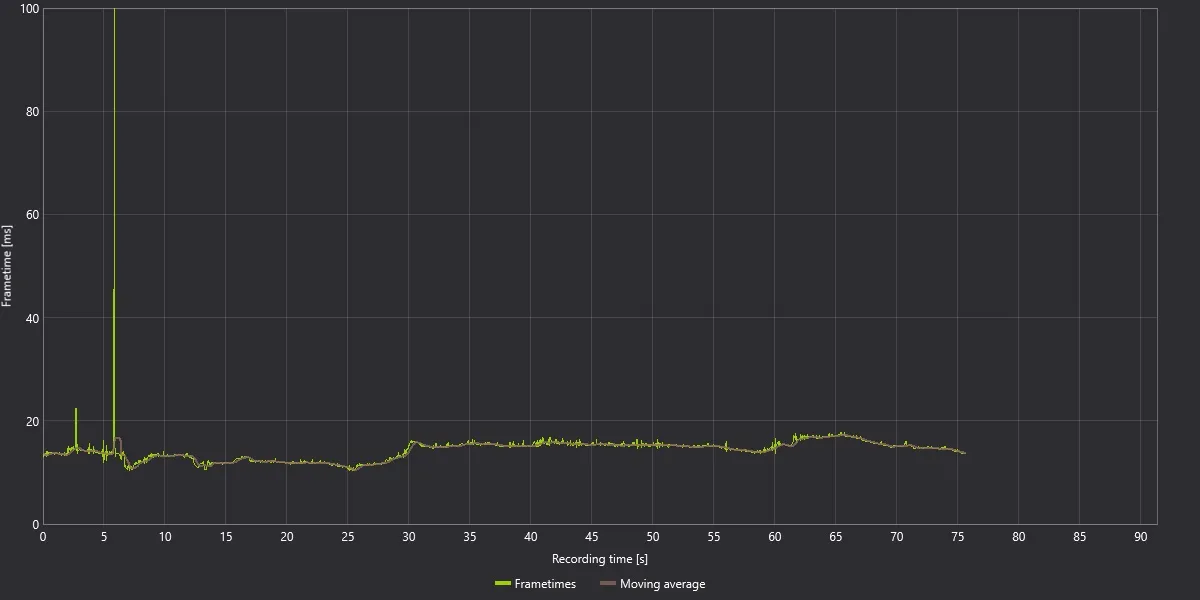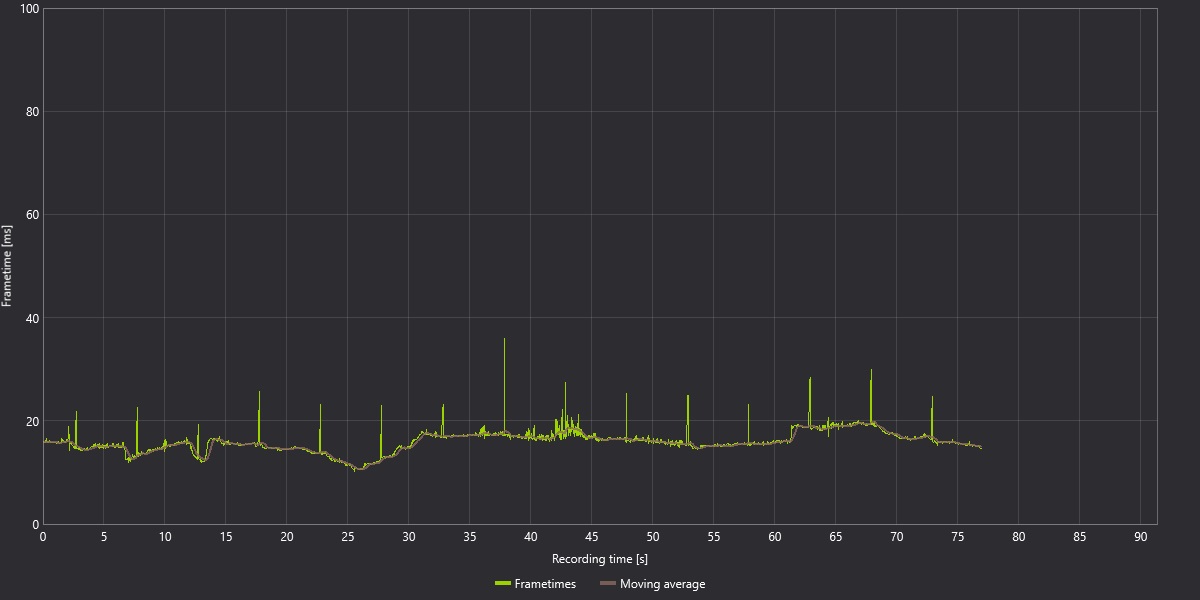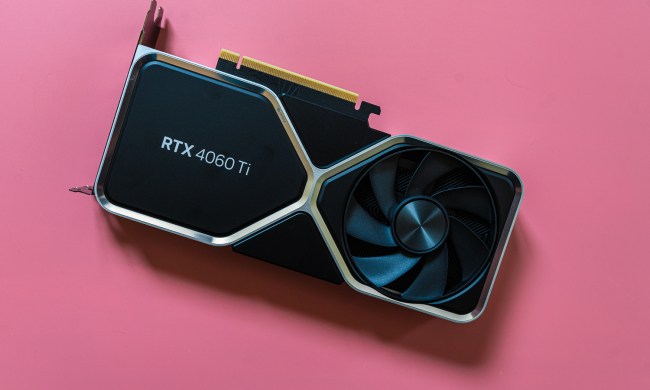
The RTX 4060 Ti isn’t one of the best graphics cards you can buy. It’s hard to even call it a good graphics card, with reports suggesting that there has been “zero” interest in Nvidia’s latest GPU. I’ve tested the card, and I was going to review it, but this is a GPU that challenges the status quo.
If you visit several sites that review graphics cards, you’ll find that scores are all over the place. Some are praising the card for solid power efficiency improvements and Nvidia’s Deep Learning Super Sampling (DLSS) at a lower price, while others are focusing on its limited VRAM and the implications that has in modern games.
And both are viewpoints are right. The RTX 4060 Ti is the cheapest way to get DLSS 3, and it absolutely obliterates the competition when it comes to ray tracing. You can’t ignore the VRAM issues with the card, though, as it’s not adequately equipped to handle the demands of games in 2023, much less games arriving in the next several years.
If you want a simple answer, the RTX 4060 Ti is a fine option if you want DLSS 3 and don’t care about turning down settings in some games. Nothing about this GPU is simple, though, and once you start digging into what represents a $400 investment, its problems become too big to ignore.
It’s faster, for sure

Let’s get this out of the way upfront: The RTX 4060 Ti is faster than the RTX 3060 Ti. When we look at the horsepower on tap, it wins — and that’s apparent if you look at my standard test suite of games. That’s clearest at 1080p, where the RTX 4060 Ti provides a solid 27% improvement over the RTX 3060 Ti and nearly matches the RTX 3070 Ti.
That’s not a bad generational improvement, and it would normally be enough to recommend a new graphics card. That’s a similar uplift the RTX 4070 provided at its target resolution, and that card earned a rare Editor’s Choice badge in my RTX 4070 review. This isn’t a scored review of the RTX 4060 Ti, but I definitely wouldn’t give it that same badge.

Looking at my 4K benchmarks reveals a hint as to why, even if the RTX 4060 Ti isn’t positioned as a 4K graphics card. At 4K, the RTX 4060 Ti is only 16% faster than the RTX 3060 Ti. That’s not normal.
When you run games at higher resolutions, your graphics card becomes the limiting factor. At 1080p, most games have at least a slight CPU bottleneck. That means you should see larger scaling at 4K than you see at 1080p, but with the RTX 4060 Ti, we’re seeing the opposite.
Look at the RTX 3060 Ti compared to the RTX 3070 Ti. At 1080p, the RTX 3070 Ti is around 29% faster, and at 4K, it’s just over 31% faster. Similarly, the RX 6600 XT is 16% faster than the RX 6600 at 1080p, but it’s 21% faster at 4K. You occasionally see some regressions depending on what two GPUs you’re comparing, but you shouldn’t see performance scaling get nearly cut in half when going from 1080p to 4K.
This is where we need to start looking at other games. Although my normal test suite has a range of demanding titles, this strange behavior is better explained by more recent releases.
Wait, it’s not faster?
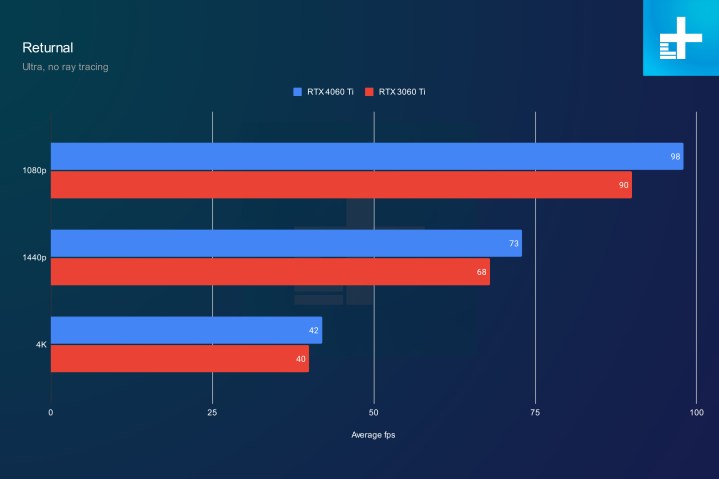
The RTX 4060 Ti looks pretty bad in Returnal. At 1080p, it provides an acceptable but disappointing 9% lead over the RTX 3060 Ti, but at 4K, it drops to only a 5% improvement — or, in real-world terms, only two frames. That’s a far cry from the 27% improvement I saw in my standard test suite, and although it’s easy to write off a single game as an isolated issue, the RTX 4060 Ti’s problems run deeper.
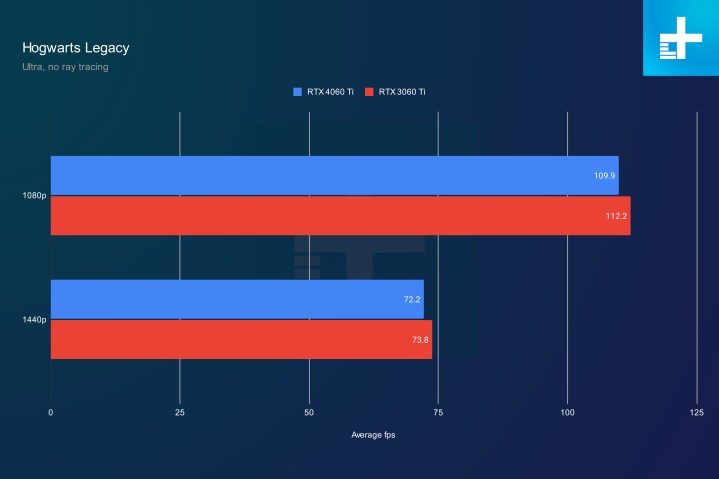
In some games, the RTX 3060 Ti is actually faster. No, the chart of Hogwarts Legacy above doesn’t have a typo. That’s the RTX 3060 Ti outperforming the RTX 4060 Ti at 1080p and 1440p. It’s only a 2% lead, but the RTX 3060 Ti launched in December 2020 for the same $400 that Nvidia is asking for the RTX 4060 Ti right now.
That’s not the worst of it, either. In The Last of Us Part 1, the RTX 3060 Ti is 12% faster at 1080p and nearly 40% faster at 1440p. There’s more to the story with this chart that I’ll dig into in the next section. In reality, the RTX 3060 Ti should only be around 10% faster than the RTX 4060 Ti, but even that’s really bad news. As a side note, these tests were run with the latest patch to The Last of Us on PC, which specifically addresses VRAM usage.
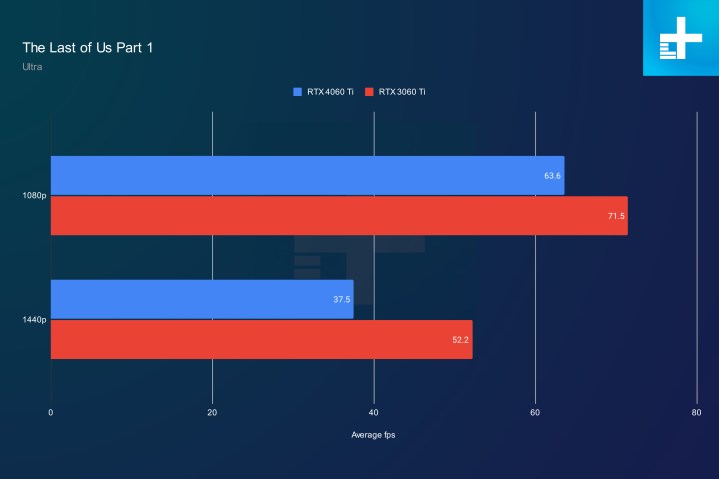
Don’t take these numbers as law. As the performance in the above section establishes, the RTX 4060 Ti is indeed faster than the RTX 3060 Ti. These games simply stress the VRAM issues the RTX 4060 Ti has and expose the implications of that in modern games.
The death of 8GB? It’s not so simple

The RTX 4060 Ti has come under fire for having only 8GB of video memory, but as my testing shows, boiling down its issue to memory capacity alone doesn’t really get at the problem. The RTX 3060 Ti only has 8GB of memory as well. It should be around 20% to 30% slower than the RTX 4060 Ti, but in VRAM-constrained scenarios, it’s sometimes faster even with the same capacity of memory. This is a bandwidth issue.
The Last of Us Part 1 shows the issue off clearly. It maxes out VRAM usage on the RTX 3060 Ti and RTX 4060 Ti, but the RTX 4060 Ti feels the effects much more. The RTX 3060 Ti isn’t actually 40% faster than the RTX 4060 Ti in this game at 1440p. It’s just that the RTX 3060 Ti is able to stream more data into memory at once, avoiding some major stutters that come up with the RTX 4060 Ti.
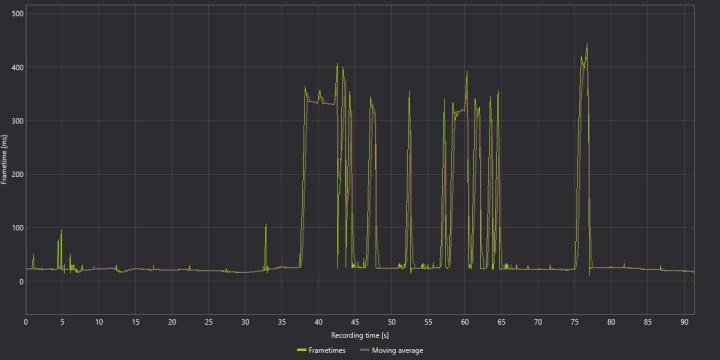
If you look at the chart above, you can see that the game went down to around three frames per second (fps) for several seconds in brief spurts, resulting in a much lower average compared to the RTX 3060 Ti. Normally, I’d throw out this data, but it’s a consistent problem on the RTX 4060 Ti. My best guess is that the VRAM buffer needs new data streamed in, resulting in a big slowdown.
It’s not always this severe, but it’s present. If you look at the two charts above, you can see consistent spikes in frame time at 1080p with The Last of Us Part 1 with the RTX 4060 Ti, but only one such spike with the RTX 3060 Ti. This isn’t just in The Last of Us Part 1, either. In Hardware Unboxed’s review of the RTX 4060 Ti, you can see similar stuttering slowdowns at 1080p in both A Plague Tale: Requiem and The Callisto Protocol.
The result doesn’t always manifest in a performance chart, either. As you can see in my look at Redfall on PC, optimizations for VRAM can result in distracting pop-in and lowered textures in certain games. Although your performance may still keep up, the game doesn’t look great, which is the case for Redfall and a game like Hogwarts Legacy.
What’s going on? The RTX 4060 Ti and RTX 3060 Ti both have 8GB of VRAM, but the RTX 4060 Ti has a much narrower memory bus. The size of the memory bus determines how much data can travel between the memory and the GPU at once. The RTX 3060 Ti has a 256-bit memory bus, but the RTX 4060 Ti only has a 128-bit bus for the same 8GB of GDDR6 memory.
In a bit of prelaunch astroturfing, Nvidia explained that it was able to use a thinner bus due to an increased L2 cache on the RTX 4060 Ti. This isn’t exactly a new concept — AMD introduced its Infinity Cache to improve memory bandwidth a couple of years ago — but the idea is that a larger cache increases total bandwidth, rather than relying on a larger memory bus alone.
That leads to theoretically higher bandwidth, but the real-world results are clear: In VRAM-constrained scenarios, the RTX 4060 Ti runs into problems that aren’t present with the larger memory bus on the RTX 3060 Ti.
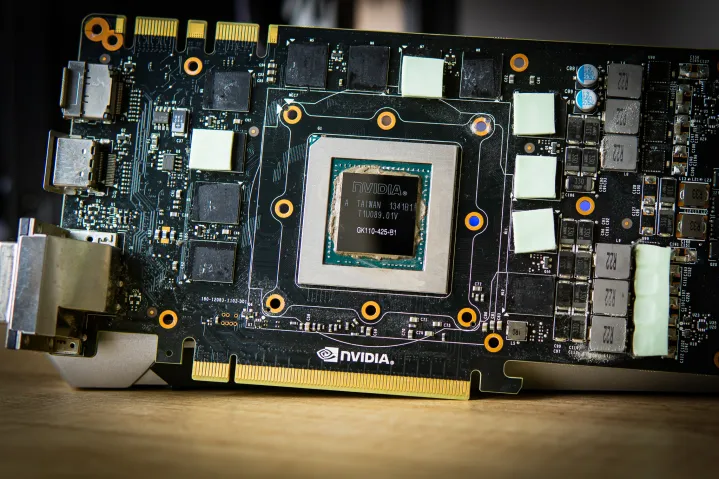
The RTX 4060 Ti is a strange situation where its raw power and price doesn’t match its memory spec. It’s the spec the RX 7600 has, but that GPU is $130 cheaper and in a clear performance class below the RTX 4060 Ti. It makes sense for the upcoming RTX 4060, which is launching in July with 8GB of VRAM for $300, but not for the $400 RTX 4060 Ti. At this price and performance, it should have 16GB of memory, or at the very least, a larger bus size.
Something like the 12GB RX 6700 XT’s memory system would probably have been a better fit for the RTX 4060 Ti. It has 12GB of VRAM and 96MB of Infinity Cache, allowing more data to be stored on the graphics card so it doesn’t need to go out to system memory. The RX 6700 XT is slower than the RTX 4060 Ti at 1080p, so I don’t want to mislead anyone here. But it’s a solid example of what the memory system should look like in this class of graphics card for the demands of 2023.
With a card like the RTX 4060 Ti, it’s easy to look at the 8GB capacity and demand more VRAM. More VRAM helps, definitely, but the RTX 3060 Ti is proof that it doesn’t all come down to capacity. I’m curious what an RTX 4060 Ti with a larger memory bus would look like, and how the card would fare in VRAM-limited games in that case. I suspect it would look a lot better.
Not enough for 2023
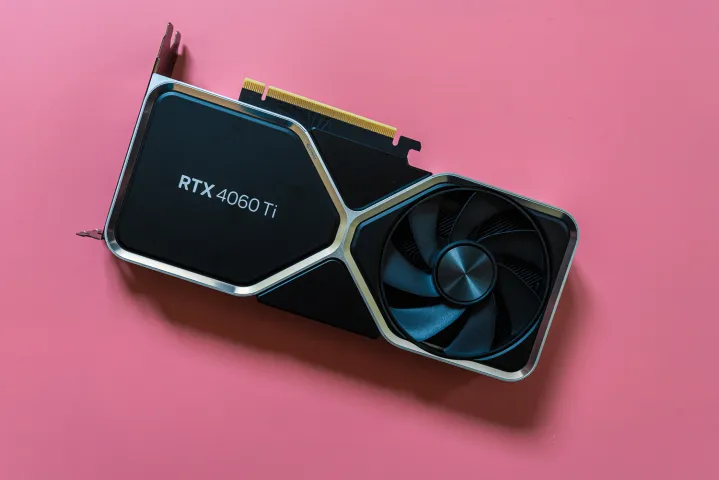
It’s clear Nvidia knows there’s a problem here. It’s releasing a $500 version of the RTX 4060 Ti in July with 16GB of VRAM. By its own admission, “there are a handful of games which run best at the ‘High’ preset on the 4060 Ti (8GB), and maxed-out ‘Ultra’ settings on the 4060 Ti (16GB),” despite the fact that the cards “will deliver the same performance” in “most games.” And that’s with the games we have today. The problem could only become exaggerated as time goes on (remember, the Xbox Series X has 10GB of VRAM and the PS5 has 16GB).
Did Nvidia hamstring its own GPU to push buyers toward the more expensive 16GB model? Is this a situation where GPU prices are just going up, similar to what we’ve seen with the RTX 4080? I don’t know, I don’t care, and you shouldn’t either. Ultimately, it comes down to getting the most performance for the lowest price, and the RTX 4060 Ti misses that mark.
Instead, there are a few other great graphics cards around the same price. AMD’s RX 6700 XT is slower, but it doesn’t run into VRAM issues like the RTX 4060 Ti, and it’s around $50 to $70 cheaper. If you can expand your budget, the RTX 3070 offers similar performance for around $50 more and comes with a wider memory bus. It can still run into VRAM limitations, but they aren’t as severe as they are on the RTX 4060 Ti.
I’m not giving the RTX 4060 Ti a scored review because I can’t evaluate its performance in good faith. In some games, it looks like a fantastic generational upgrade, while in others, it looks like one of the most disappointing GPUs ever released. Regardless, you shouldn’t buy it, at least not until its list price comes down significantly.

